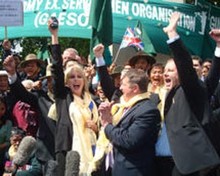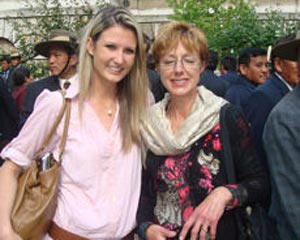 Credit: Laura-Jane Hawkins
Credit: Laura-Jane Hawkins But, refusing to rest on her laurels on the day when the the Nepalese soldiers where told they could settle in the UK, Hawkins was soon invited inside Number 10 and conducting exclusive interviews with Lumley, immigration minister Phil Woolas and home secretary Jacqui Smith.
Journalism.co.uk caught up with the trainee journalist, who began her MA in Broadcast Journalism at the University of Westminster after completing a law degree, to ask how she 'sweet-talked' her way to her biggest scoop so far.
When did you first get involved in the Gurkhas story?
As part of my MA, I had to create a 15-minute radio documentary. The topic could be our own choice and because of my legal background, I am always passionate about current affairs and law-related issues. I was aware of the high-profile campaign on Gurkhas and their settlement rights here in the UK and decided that it was a topical, newsworthy and interesting subject which could make a good documentary for a wide audience. It was something that I could get my teeth into and it was going to keep me interested and motivate me whilst conducting interviews and putting the piece together.
I gathered my interviews including Lord Lee of Trafford (the first to put forward a bill to the House of Lords regarding the Gurkhas and their rights), the British Gurkha Welfare Society, MP Bob Walter and many other Gurkhas with their personal stories and opinions.
I also had the government's point of view at the time and an immigration lawyer speaking about the legal implications. I was fairly happy with what audio I had and I enjoyed putting the 15-minute piece together, although I was disappointed that Lumley was filming all week and I therefore failed in gaining an interview with her.
When did you see the opportunity to get into Number 10 and how did you make it happen?
I had more or less created my radio documentary which was due in at 5pm on Thursday May 21.
However when I woke up on the Thursday morning I heard on the news that Gordon Brown had called a meeting with Lumley. I automatically knew my documentary was out-of-date and this was going to be 'The Day' that Lumley and all Gurkha campaigners had been waiting for.
I was desperate for an interview with Joanna Lumley so I jumped out of bed, threw on my clothes and caught the tube down to Downing Street. I was hoping to catch her walking out of the early morning meeting, but unfortunately the Victoria line was suspended and by the time I ran up to the gate of Downing Street, I was told by the smiling policeman that I had missed her by only 6-7 minutes.
 I was pretty gutted and annoyed that I had missed her by only minutes. I crossed over the street and sat on the low, grey wall opposite Downing Street. Five minutes later, a man, whom I now know as Peter Carroll [a member of the Gurkha justice campaign], stood right in front of me with the Channel 4 news crew. I decided to take the opportunity and went over to him as his interview finished.
I was pretty gutted and annoyed that I had missed her by only minutes. I crossed over the street and sat on the low, grey wall opposite Downing Street. Five minutes later, a man, whom I now know as Peter Carroll [a member of the Gurkha justice campaign], stood right in front of me with the Channel 4 news crew. I decided to take the opportunity and went over to him as his interview finished. After explaining who I was and the documentary I was making, Carroll allowed me to interview him about the issue.
I let my disappointment at missing Lumley be known and he told me he would be meeting up with her in the next hour or so and invited me to join him, his wife Lynne Beaumont (in right of picture with Laura) and the lawyers for the campaign.
The day continued with a statement read out by Jacqui Smith stating that Gurkhas would now be given the right to settle in the UK whether or not they had retired before or after 1997. A press conference with Lumley followed where I gained some great audio and it was then later on in the afternoon when Lumley, the campaigners and the Gurkhas were invited for tea and biscuits on the lawn of Number 10 Downing Street.
I had spent the whole day with the campaigners and lawyers and so I asked if I could join them to gain extra audio for my documentary. As we all queued up outside the gate, I wondered whether I would be turned away. On arrival, the policemen gave me a long, hard look, he then looked at the lawyers and campaigners and as they nodded in approval, I was allowed through.
I accompanied Lumley and the Gurkhas down Downing Street and into the residence. We walked through the long hallway/reception area, through a dining room area and out onto the perfectly mowed lawn where maroon coloured chairs and tea and biscuits were waiting.
It was a surreal experience as around 60 or so Gurkhas swarmed around this secret city garden. I was able to meet and interview Jacqui Smith and Phil Woolas and also gain another interview with Lumley herself. After 15 minutes, three cheers were given as Gordon and Sarah Brown walked down the garden steps and onto the lawn. He carefully took the time to shake the hand of every Gurkha present and knelt down to speak to those in wheelchairs. Photographs were taken and speeches were given with lots of cheering and clapping in-between.
I even got the chance to introduce myself and shake Gordon Brown's hand, though I had been warned not to attempt to interview him by an official Downing Street staff member.
It was a wonderful experience that I will always remember and I am glad that I witnessed such a historic and joyous event first-hand. At the time, it didn't sink in - the situation that I was in - but looking at my photos and audio now, I am ecstatic that I had such a memorable opportunity.
What was the reaction when the decision was announced?
This moment was memorable in itself, purely because of the reactions of all around. Lumley was emotional whilst listening to Jacqui Smith read out the statement, but as the home secretary announced the main change in the law, all Gurkhas and campaigners seemed to simultaneously jump for joy, throwing their fists in the air and cheering with pure happiness and gratitude.
Even the media cheered and the general public standing watching from a distance. It was an historic day for all when these humble Gurkhas achieved the rights that they had wished for.
What are you planning to do with the material?
I now have some excellent material for my 15-minute radio documentary so I hope to put it together in the best way that I can and gain a high grade for my piece of work. I will also be blogging my experience with my audio and photographs at www.ljhawkins.wordpress.com.
In addition, I hope to continue my interest in this topic and I have good contacts in order to create a follow-up radio or TV documentary on how this decision is realistically affecting the Gurkhas and their families and how many Gurkhas now want to move to the UK. I hope that this personal documentary will be commissioned by the BBC and it will cover Gurkhas based here in the UK and those that I meet when I go over to make the documentary in Nepal.
Is this your biggest 'scoop' so far?
This is certainly my biggest 'scoop' so far and it has proved to me (along with all my other journalism experience) that I have made the right decision to change to journalism from the law. I had come from sitting on a wall outside Downing Street at 10am with no contacts at all to having tea in the Prime Minister's garden by 4.30pm. A small radio documentary on the Gurkhas turned into one of the biggest days of my journalism life so far.
I love meeting new people, finding a story and having a new focus and a new adventure every day. I hope that I can achieve all that I want in journalism and hopefully with my determination and eagerness I will get as close as I can to any story. I am now creating a longer documentary on the assisted suicide debate which is another legal point that I find extremely interesting.
What kind of journalism do you see yourself getting into?
I hope to cover current and home affairs when I work in journalism. I love legal issues and politics and I enjoy topics that have a strong debate behind them.
I am also an adrenalin junkie and have a passion for travelling and adventure activities so any travel journalism or foreign/war-related stories or reports would be right down my alley. I'm truly looking forward to my career in broadcast journalism and I look forward to informing people of the news and of the truth.
Free daily newsletter
If you like our news and feature articles, you can sign up to receive our free daily (Mon-Fri) email newsletter (mobile friendly).
Related articles
- Meet the inspiring, disabled journalists working their dream jobs
- Shaping the future of journalism: insights for the next generation
- New free course on war reporting launched
- Solutions journalism superstars: media mentor and trainer, Swati Sanyal Tarafdar
- Preethi Nallu, global director, Report for the World, on strengthening media ecosystems









